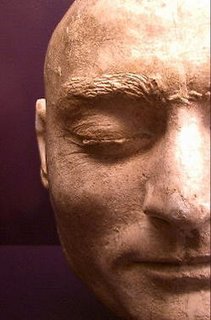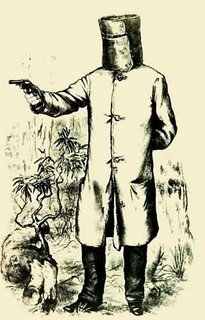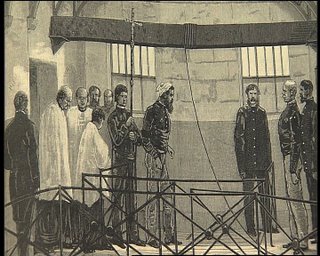 Bushrangers have been seen as heroes and champions of the underdog, who, Robin Hood style, robbed from the rich to give to the poor (or at least to unseat the rich from the arrogance of privilege). On the other hand, they have also been seen as mad dogs, murderers, scoundrels, and rebels, deserving the full weight of civilization’s unbending justice. Australia’s most famous bushranger Ned Kelly (1855-1880) has generated both sets of sympathies.
Bushrangers have been seen as heroes and champions of the underdog, who, Robin Hood style, robbed from the rich to give to the poor (or at least to unseat the rich from the arrogance of privilege). On the other hand, they have also been seen as mad dogs, murderers, scoundrels, and rebels, deserving the full weight of civilization’s unbending justice. Australia’s most famous bushranger Ned Kelly (1855-1880) has generated both sets of sympathies.
According to Bill Gammage, “Bushranger is an Australian word. It evokes bushcraft, daring, defiance, and freedom from convention, rather than crime or evil. It touches an Australian nerve [as evidenced by] G. T. Dicks’ 1992 A Bushranger Bibliography [listing] over 1200 books [almost 100 on Ned Kelly]." Sympathy for Kelly is not something read back anachronistically into a distorted past. It began during his lifetime and has continued to the present. I recently came across the following interesting incident in Morna Sturrock’s biography of Bishop James Moorhouse, Bishop of Magnetic Power (2005) while reviewing her book for History Australia, which brings sympathy for Kelly into focus. The second Anglican Bishop of Melbourne, Moorhouse, visited north-west Victoria in October-November 1878. The newspaper headlines spoke of the “Mansfield Outrage,” Sgt. Michael Kennedy having been shot dead by Ned Kelly, alkong with three other cionstables, at Stringybark Creek. His body was brought into Mansfield and Moorehouse was called upon to preach there. Kennedy (and Kelly) were Catholic but Moorehouse visited his grieving widow to console her and also to strongly advise her against viewing “the poor disfigured corpse” of her husband. Half his face had been shot off and a wild animal had chewed off his left ear sometime over the three days his body lay in the bush before it was discovered. "She agreed," wrote Moorhouse, "that I should go and see if the sight were fit for her; and when I told her it would be wicked for her in her state of health to subject herself to such a shock, she went quietly home. I attended the poor Sergeant’s funeral. The Priest asked me to walk with him at the head of the procession."
 The funeral service, from St. Francis Xavier’s Catholic Church was quite an ecumenical occasion with Moorehouse leading the procession along with Father Scanlan, Samuel Sandiford, the Anglican rector of Mansfield, and the local Presbyterian minister, the Rev. Reid. In the age of sectarianism this is quite notable. Father Scanlan had ridden by night, “along the wild road from Benalla, with the reins in one hand, and a revolver in the other.” While standing in solidarity with the victims of the crime and insisting that the perpetrators should be tracked down and arrested, at the same time Moorehouse showed remarkable sympathy for the Kelly Gang. "Poor wretches! One cannot help pitying them, crouching among the trees like wild beasts – afraid to sleep, afraid to speak, and only awaiting their execution. But bushranging is so horrible, so ruthless, so utterly abominable a thing, that it must be stamped out at any cost." Two days after the funeral while preaching in the church at Mansfield he repeated these remarks, prayed for the murderers and told the people they should “pity the poor wretches who caused us to mourn over these disasters.”
The funeral service, from St. Francis Xavier’s Catholic Church was quite an ecumenical occasion with Moorehouse leading the procession along with Father Scanlan, Samuel Sandiford, the Anglican rector of Mansfield, and the local Presbyterian minister, the Rev. Reid. In the age of sectarianism this is quite notable. Father Scanlan had ridden by night, “along the wild road from Benalla, with the reins in one hand, and a revolver in the other.” While standing in solidarity with the victims of the crime and insisting that the perpetrators should be tracked down and arrested, at the same time Moorehouse showed remarkable sympathy for the Kelly Gang. "Poor wretches! One cannot help pitying them, crouching among the trees like wild beasts – afraid to sleep, afraid to speak, and only awaiting their execution. But bushranging is so horrible, so ruthless, so utterly abominable a thing, that it must be stamped out at any cost." Two days after the funeral while preaching in the church at Mansfield he repeated these remarks, prayed for the murderers and told the people they should “pity the poor wretches who caused us to mourn over these disasters.”
Not long after the funeral, Moorehouse and his wife stopped at an inn in Benalla for a meal and a change of horses. They were surprised to notice Chief Commissioner Standish, who was overseeing a yearlong search for the Kelly Gang, leave the inn without speaking with them. As the Moorehouses moved on they noticed a mounted policeman up ahead of them and others stationed here and there along their route as if keeping watch over them. Upon returning to Melbourne he was informed that the Kellys were angry at the Bishop’s influencing of public opinion against them and had planned to kidnap him, spirit him away to the mountains and hold him for ransom. While enjoying a smoke in the garden of the inn he had been in range of their rifles. However, some of the Kelly supporters thought such an action would damage their cause and so warned the police; hence the armed escort.
Many alienated small farmers and farm labourers became Kelly “sympathisers.” John McQuilton’s The Kelly Outbreak (1979) describes widespread agricultural ignorance, poverty, and disillusionment in north-east Victoria at this time. Colin Holden’s history of the Diocese of Wangaratta, Church in a Landscape, states that the Kelly Gang enjoyed support in the local community because struggling farm workers saw Kelly’s plight as an exaggerated form of their own situation. Rural newspapers of the day noted that the Kellys also enjoyed support among “the respectable and well-to-do” people, including Anglicans, “who might in other circumstances appear as supporters of law and order.” The Church of England Messenger said that bushrangers could always count on finding “punctual provisions and trusty spies among the settlers in the remote districts.”
 In discussing the question of whether Kelly should be viewed as a violent psychopathic criminal or a hero of the people, more sinned against than sinner, one of my students asked whether 100 years ago we would be remembering serial killer Ivan Mallatt as favourably as we remember Kelly today. The answer to the question is “no” for many reasons, but one of those reasons is that Kelly was a popular figure in his day. Ivan Mallatt and his kind have no supporters. They are psychopaths who seem to kill for no reason and with no remorse. 38,000 people signed a petition for Kelly’s pardon. No one today advocates for Millatt. Kelly was a violent man enmeshed in the criminal underworld of north-east Victoria in age of widespread police brutality and corruption. Criminals are the results of both nature and nurture; communities produce them as much as women give birth to them. It was “not easy being an Irishman in Queen Victoria’s colony.” People do not commit crimes simply because they are evil and the world is not a place made up of men and women who are either good or evil. We are more complex creatures than that. I think Bishop Moorehouse understood this and so he prayed for the “poor wretches” who made up the Kelly gang and he exhorted his flock to have pity on them. So was Kelly a hero or a criminal? Probably both.
In discussing the question of whether Kelly should be viewed as a violent psychopathic criminal or a hero of the people, more sinned against than sinner, one of my students asked whether 100 years ago we would be remembering serial killer Ivan Mallatt as favourably as we remember Kelly today. The answer to the question is “no” for many reasons, but one of those reasons is that Kelly was a popular figure in his day. Ivan Mallatt and his kind have no supporters. They are psychopaths who seem to kill for no reason and with no remorse. 38,000 people signed a petition for Kelly’s pardon. No one today advocates for Millatt. Kelly was a violent man enmeshed in the criminal underworld of north-east Victoria in age of widespread police brutality and corruption. Criminals are the results of both nature and nurture; communities produce them as much as women give birth to them. It was “not easy being an Irishman in Queen Victoria’s colony.” People do not commit crimes simply because they are evil and the world is not a place made up of men and women who are either good or evil. We are more complex creatures than that. I think Bishop Moorehouse understood this and so he prayed for the “poor wretches” who made up the Kelly gang and he exhorted his flock to have pity on them. So was Kelly a hero or a criminal? Probably both.
If you enjoyed this blog entry you might also enjoy the following: Ned Kelly and the Wesleyan Preacher; The History Wars; "Wiping Out" the Aborigines and The Proposition
 "Postmodernism, at least as applied to history, is an intellectual dead end which will one day be equated with pseudo-sciences such as phrenology ["reading" the bumps on people's heads] in the early nineteenth century and the study of the paranormal later...[It] will be seen - sooner one hopes rather than later - for an 'emperor's clothes' phenomenon, and...there will be wonderment that so many clever people wrote, believed, and applauded so much manifest nonsense, and were promoted for doing so; and that it it inspired the writing of so much ugly, pretentious, jargon-ridden English."
"Postmodernism, at least as applied to history, is an intellectual dead end which will one day be equated with pseudo-sciences such as phrenology ["reading" the bumps on people's heads] in the early nineteenth century and the study of the paranormal later...[It] will be seen - sooner one hopes rather than later - for an 'emperor's clothes' phenomenon, and...there will be wonderment that so many clever people wrote, believed, and applauded so much manifest nonsense, and were promoted for doing so; and that it it inspired the writing of so much ugly, pretentious, jargon-ridden English."
 Soon after at the conclusion of one of the prison services, a warder approached Coles and asked if he would like to see Kelly. He said he would but that the governor would not allow it. The warder told him there was a regulation that any prisoner who requested it could see the minister who had been conducting the service. The warder went to see if Kelly wanted to speak with Coles and was told that he did and that he had heard every word of the service from his prison cell. Here is the fascinating description Coles gives of Kelly. "This man by no means looked a ruffian. He had rather a pleasant expression of countenance. He was one of the most powerfully built and finest men that I ever saw. He treated me with great respect, listened to all I had to say, and knelt down by my side when I prayed."
Soon after at the conclusion of one of the prison services, a warder approached Coles and asked if he would like to see Kelly. He said he would but that the governor would not allow it. The warder told him there was a regulation that any prisoner who requested it could see the minister who had been conducting the service. The warder went to see if Kelly wanted to speak with Coles and was told that he did and that he had heard every word of the service from his prison cell. Here is the fascinating description Coles gives of Kelly. "This man by no means looked a ruffian. He had rather a pleasant expression of countenance. He was one of the most powerfully built and finest men that I ever saw. He treated me with great respect, listened to all I had to say, and knelt down by my side when I prayed."




